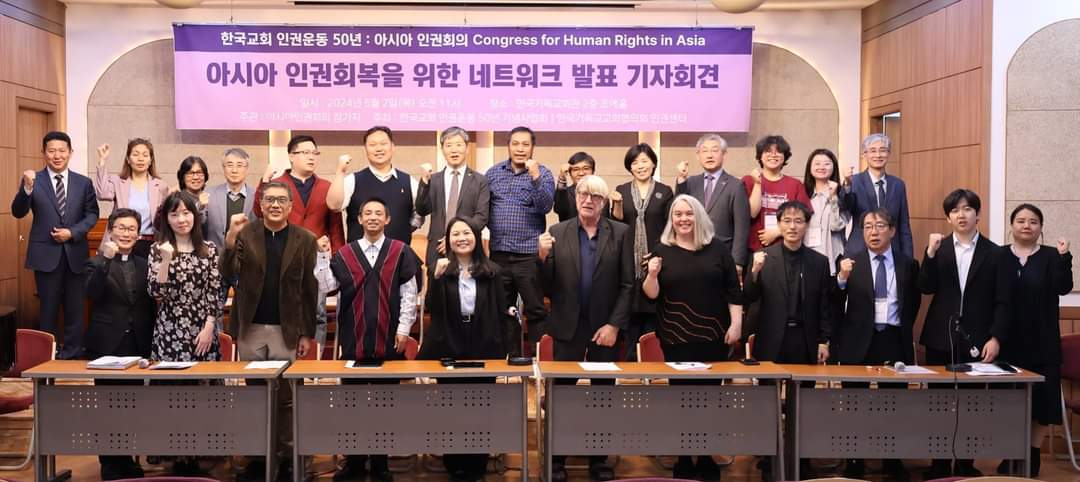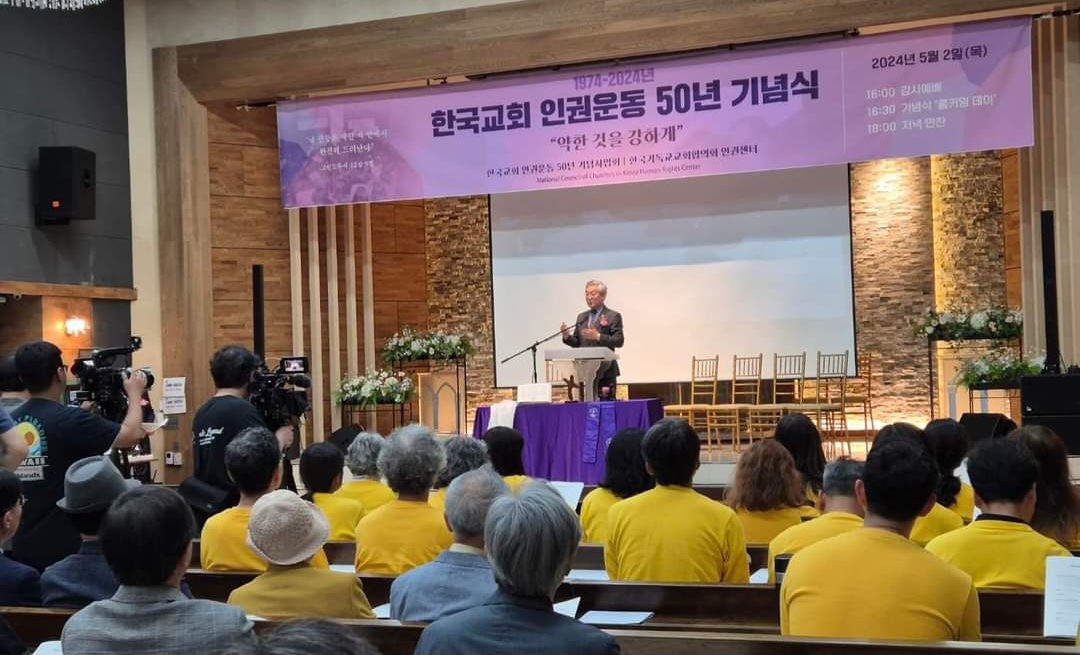
[성명] 아시아 인권회의: “민중의 연대로 하나님의 형상을 회복하자”
“하나님이 자기 형상 곧 하나님의 형상대로 사람을 창조하시되...”(창세기 1:27)
Congress for Human Rights in Asia
“Reclaiming Imago Dei: People to People’s Solidarity”
지난 4월 27일부터 5월 2일까지 캄보디아, 인도, 인도네시아, 일본, 미얀마, 필리핀, 스리랑카, 대만, 한국과 캐나다의 교회를 대표하는 60여 명의 참석자는 수유리 한신대학교 신대원에 모여 “민중의 연대로 하나님의 형상을 회복하자”라는 주제로 아시아 인권회의를 개최하였다.
이번 인권회의는 1970~1980년대의 잔혹한 독재정권에 맞서 민주주의를 위한 투쟁에 앞장서 온 한국기독교교회협의회(NCCK) 인권위원회(현재의 NCCK 인권센타) 창립 50주년을 성찰하고 기념하는 자리였고, 동시에 모든 이들에게 내재된 하나님의 선물인 인간의 존엄성을 수호하고 아시아 인권옹호자들의 연대를 다짐하는 자리였다.
1. 지구적 현실
지금 우리는 신자유주의 시대가 가져온 전 지구적 대규모 빈곤과 불평등, 기후변화에 의한 경제위기의 심화, 지정학적 갈등과 전쟁 등으로 매우 도전적인 시기를 목도하고 있다. 지난 수년간의 코로나 19를 거치면서 부의 불평등은 심화되었고, 정의롭지 못한 전쟁이 빈번히 발발하고 있으며, 징벌적 신자유주의 정책들이 증가하고 있다. 초강대국 간의 갈등과 대립으로 1945년 이후 정착되어 온 국제인권규범과 다자주의의 원칙이 붕괴되는 등, 지금 우리는 심각한 구조적 위기와 도전에 직면해 있다.
세계의 많은 정부는 신자유주의에 의한 착취를 방조하고 있다. 또한, 점점 증가하고 있는 우파 정부는 배타적인 정책을 확산하는 가운데 외국인 혐오증을 조장하고 원주민의 권리를 침해하며, 이주민과 난민 등 고향 잃은 이들의 권리를 제약하고 LGBTQI++ 성소수자 공동체를 차별하는 등 우리 사회의 인권과 자유를 광범위하게 억압하고 있다.
2. 아시아의 현실
미국과 중국의 주도권 경쟁은 동북아에서 지정학적 긴장을 고조시키고 있다. 중국을 봉쇄하기 위한 미국의 인도-태평양 전략으로 인해 아시아의 여러 국가가 전쟁의 소용돌이 속으로 끌려 들어가고 있다. 그뿐만 아니라 아시아 국가들은 여전히 식민주의의 잔재와 권위주의 통치의 사슬에 시달리고 있으며, 심각하게 확산되고 있는 군국주의와 파시즘은 민주주의와 인권의 근간을 더욱 위협하고 있다.
일본은 전후 미국과의 안보조약에 따라 중국, 북한, 러시아의 위협에 대응하기 위해 상당한 규모의 미군을 주둔시키고 있다. 이는 동북아 지역에서 힘의 역학관계 중심이 되고 있으나 평화헌법 9조 조항을 위배하는 행위이다. 한국은 남북관계와 한반도 평화프로세스 전반에 부정적인 영향을 미치고 있는 미국의 광범위한 아시아 전략적 이해관계에 부응하고 있다. 한편 대만은 1979년 이후 미군 기지의 부재에도 불구하고 중국의 지역적 야망을 봉쇄하기 위하여 미국과 공식적으로 전략적 군사협력을 유지하고 있다. 동남아시아에서도 비슷한 긴장이 발생하고 있다. 필리핀은 많은 미군을 주둔시키고 남중국해나 서필리핀해에서 미국, 일본과 함께 전쟁훈련을 하고 있는데, 이로 인하여 중국과의 갈등이 고조되고 있다.
아시아 인권 상황은 심각한 도전과 갈등에 직면해 있다. 페르디난드 마르코스 주니어 대통령이 집권한 필리핀에서는 인권활동가와 시민사회, 지역 사회에 대한 공격과 다양한 국제 인도주의법에 대한 위반이 증가하면서 심각한 인권침해로 이어지고 있다. 또한, 미얀마에서는 군사 쿠데타 이후 광범위한 억압과 폭력이 발생하고 있으며 이는 인권상황 악화의 근본 원인이 되고 있다. 강제징병과 공격적인 군사 행동으로 많은 이들이 난민이 되었고 이로 인한 인도주의적 위기는 더욱 고조되고 있는 가운데, 로힝야족은 여전히 난민으로 남아 있다. 인도네시아에서는 고질적인 부패 문제에서부터 반대자에 대한 탄압과 언론의 자유제한에 이르기까지 민주주의의 근간이 흔들리고 있다. 파푸아의 인권침해는 심각한 수준이며 선주민 공동체는 자원분쟁으로 인하여 조직적 차별과 인권침해로 고통받고 있다. 홍콩에서 새롭게 제정된 국가보안법은 주민들의 시민적, 정치적 권리를 말살하고 있다.
남아시아에서는 정부가 인종갈등과 종교적 편협성을 부채질하고 있다. 인도양에서 전개되는 미국의 전쟁훈련과 군사화는 이 지역을 더욱 위험에 빠뜨리고 있다. 2009년 스리랑카에서 자행된 엘람 타밀족에 대한 대량학살이 사실상 묵인되고 있다. 타밀족의 권리를 국제적으로 인정하며 난민들의 귀향을 보장하고 군사화를 중단하여야 한다. 인도에서는 마니푸르 같은 지역에서 발생하고 있는 소수자에 대한 폭력행위는 협치와 인권문제에 심각한 도전이 되고 있다.
이러한 아시아 현실은 지역의 행위자들과 국제사회의 동역자들이 평화, 인권, 안전을 증진하는 협치구조를 옹호하면서 복잡한 지정학적 지형을 헤쳐나가야 할 필요성을 강조하고 있다.
3. 우리의 비전과 헌신
그리스도인으로서 우리는 국가적, 지역적, 세계적 차원에서 확산되고 있는 민주주의에 대한 위협과 인권침해, 국제법 위반이라는 도전에 직면하고 있다. 하나님의 형상을 지닌 하나님의 자녀로 모든 이들의 존엄성을 수호하는 것은 우리의 신성한 사명이다. 인권침해는 하나님의 선물인 인간존엄성에 대한 모독이기에 우리는 인권침해에 맞서 함께 싸워야 한다. 또한, 우리는 각자의 자리에서 인권과 민주주의를 위해 투쟁하는 모든 이들과 연대하여 하나님의 정의를 실현할 것을 다짐한다. 이를 위하여, 우리는 아시아 국제연대를 지속해서 강화할 것이다.
4. 행동 계획 권고
아시아 인권회의에 참가한 우리는 다음과 같이 다짐한다:
- 아시아 전역의 에큐메니칼 인권네트워크를 구축하고 실무그룹을 조직한다;
- 어린이와 청소년을 위한 공공의 증언 지도력개발 프로그램을 확산한다;
- 인권상황에 대한 정보공유 및 자료 데이터베이스를 구축한다;
- 버마 플랫폼 캠페인, 한국의 종전평화캠페인, 필리핀의 정의로운 평화를 위한 국제캠페인 등, 평화-인권 캠페인을 지원한다;
- 아시아 에큐메니칼 기구 및 운동 네트워크(아시아기독교협의회, 대만 에큐메니칼 포럼, 동북 아 평화와 민중안보를 위한 포럼, 한국교회의 한반도에큐메니칼포럼 등)와 협력한다;
- 에큐메니칼 목회적 연대 방문을 조직한다;
- 인권 및 국제 인도주의법 위반 피해자에 대한 지원을 확산한다.
2024년 5월 2일/ 아시아 인권회의 참가자 일동
[영문] Congress for Human Rights in Asia
“Reclaiming Imago Dei: People to People’s Solidarity”
“So God created human beings in his own image. In the image of God he created them...” (cf. Genesis 1:27)
We, 60 delegates from Asia—Cambodia, India, Indonesia, Japan, Myanmar, Philippines, Sri Lanka, Taiwan, and Korea, and from a partner church in Canada—gathered from April 27 to May 3 at the Graduate School of Theology, Hanshin University in Seoul, South Korea for the Congress for Human Rights in Asia under the theme: “Reclaiming Imago Dei: People to People’s Solidarity”.
Our gathering is a celebration of the legacy of the Human Rights Committee of the National Council of Churches in Korea (NCCK) on its 50th anniversary. Now evolved into the NCCK Human Rights Center, it has been a leading light during the struggle for democracy against the brutal dictatorships in the 1970s and 1980s. We pledge to honor this and strengthen solidarity among human rights defenders across Asia in order to defend God's gift of human dignity inherent in every individual.
1. 1. Global Realities
Globally we are seeing difficult times marked by aggravating economic crisis and intensifying geopolitical tensions and wars, amid massive poverty, inequality and increasing vulnerability to climate change brought about by the era of neoliberalism. There are more billionaires today than before the pandemic. There are more unjust wars and there are more punishing neoliberal policies being implemented by governments. We are confronted by profound challenges and systemic crises brought about by worsening inter-imperialist rivalries that underscore the breakdown of international human rights norms and multilateralism established since 1945.
States have only sponsored more exploitation through neoliberalism. Increasingly too, they have become more dominated by right-wing elements that have promoted exclusionary policies that challenge the fabric of diverse societies by fostering xenophobia, violating indigenous people’s rights, curtailing the rights of migrants, refugees and uprooted peoples, discriminating against sexual minority communities of LGBTQI++, and abrogating numerous other human rights and freedoms.
2. 2. Asian Realities
The U.S.-China rivalry for dominance is creating a region steeped in geopolitical tensions. The US Indo-Pacific strategy in order to contain China and various countries in Asia are increasingly being dragged into the inevitability of war. Asian nations still grapple with the remnants of colonialism and the chains of authoritarian rule, with troubling currents of militarism and fascism further threatening the fabric of democracy and human rights.
Japan, under a post-war security treaty with the U.S., hosts substantial American military forces to counter perceived threats from China, North Korea, and Russia which contravenes the Article 9 provisions in its Constitution. This places it at the center of regional power dynamics. South Korea aligns with broader U.S. strategic interests in Asia which negatively impacts inter-Korean relations and the overall peace process on the Korean Peninsula. Meanwhile, Taiwan, despite the absence of U.S. Military bases since 1979, remains officially engaged in strategic military cooperation with the U.S. to counter China's regional ambitions. Similar tensions are happening in Southeast Asia, with the Philippines hosting a large number of US troops and holding war exercises with US and Japan in South China Sea or the West Philippine Sea, further stoking conflict with China.
The human rights landscape is marked by severe challenges and conflicts. The Philippines under President Ferdinand Marcos, Jr. has seen an intensification of human rights abuses with increased attacks against activists, civil society, communities in the countryside as well as various violations of international humanitarian law. Similarly, Myanmar has deteriorated significantly following a military coup, with widespread oppression and violence. Mandatory military conscription and aggressive military actions have forced many to flee, exacerbating the humanitarian crisis. In all of these, the Rohingya remain displaced.Indonesia continues to struggle with its so-called democratic system, facing persistent issues from corruption to the suppression of dissent and limited freedom of speech. The human rights violations in Papua are acute, where indigenous communities suffer from systemic discrimination and rights abuses amid resource conflicts. In Hong Kong, a newly enacted National Security Law further silences civil and political rights.
In South Asia, governments are fanning the flames of ethnic conflicts and religious intolerance and the U.S. war exercises and militarization in the Indian Ocean further endangers the region. In Sri Lanka, the genocide against the Eelam Tamils in 2009 has been virtually ignored and the calls for international recognition of Tamil rights, return of refugees to their lands, and a stop to militarization remain urgent. Similarly, in India, regions like Manipur face severe strife where targeted actions against minorities continue, reflecting broader issues of governance and rights abuses.
These regional realities underscore a need for regional actors in Asia and international partners to navigate these complex geopolitical landscapes while advocating for governance structures that promote peace, human rights, and stability.
3. 3. Our Vision and Commitment
As Christians, we are deeply troubled by the human rights abuses and violations of international law that has subverted democracy on a global, regional, and national scale. It is the sacred task of Christians to defend the dignity of every person who are each a child of God and a bearer of God’s image. As such, Christians must work together against rights abuses because they are an affront to God’s gift of human dignity. As such, we pledge ourselves to fulfill God's justice by standing in solidarity with our siblings struggling for human rights and democracy in their respective countries. To this end, we will continue to strengthen international solidarity in the region.
4. 4. Action Plan Recommendation
As participants to this Congress for Human Rights in Asia, we pledge to:
· Create an Asia-wide Ecumenical Human Rights Network and establish a working group;
· Conduct public witness leadership formation for children and youth;
· Share information on human rights situations and creation of a resource database;
· Support each other’s campaigns on peace and human rights i.e. Campaigns of Burma Platform, Korea Peace Appeal, Int’l Campaign for Just Peace in the Philippines, etc.;
· Coordinate with existing bodies and networks in the Asian Ecumenical Movement (Christian Conference Asia, Taiwan Ecumenical Forum, North East Asia Forum for Peace and People’s Security, Ecumenical Forum for Korea, etc.);
· Launch Pastoral Ecumenical Solidarity Visits;
· Generate support for victims of violations of human rights and international humanitarian law.
May 2, 2024
Participants of the Congress for Human Rights in Asia




'공동체' 카테고리의 다른 글
| 제5차 평화 순례길은 10시에 구파발역에서 만나서 함께 갔다. "북한산 둘레길 11~13코스"이다. (0) | 2024.05.20 |
|---|---|
| 아시아기독교협의회(CCA) 아시아주일 후기 (0) | 2024.05.14 |
| 해병 출신 시민들의 '채해병 사망의 진상규명과 박정훈 대령의 부당한 항명죄 기소'에 특검 촉구 (3) | 2024.04.25 |
| 김일순 교수의 노인 본색 (10) | 2024.03.06 |
| NCCK 2024년 사순절 메시지 (0) | 2024.02.13 |